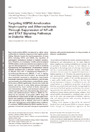Please use this identifier to cite or link to this item:
https://accedacris.ulpgc.es/jspui/handle/10553/75279
| Title: | Targeting HSP90 Ameliorates Nephropathy and Atherosclerosis Through Suppression of NF-κB and STAT Signaling Pathways in Diabetic Mice | Authors: | Lazaro, Iolanda Oguiza, Ainhoa Recio Cruz, Carlota Pilar Mallavia, Beñat Madrigal-Matute, Julio Blanco, Julia Egido, Jesus Martin-Ventura, Jose-Luis Gomez-Guerrero, Carmen |
UNESCO Clasification: | 320502 Endocrinología | Issue Date: | 2015 | Journal: | Diabetes (New York, N.Y.) | Abstract: | Heat shock proteins (HSPs) are induced by cellular stress and function as molecular chaperones that regulate protein folding. Diabetes impairs the function/expression of many HSPs, including HSP70 and HSP90, key regulators of pathological mechanisms involved in diabetes complications. Therefore, we investigated whether pharmacological HSP90 inhibition ameliorates diabetes-associated renal damage and atheroprogression in a mouse model of combined hyperglycemia and hyperlipidemia (streptozotocin-induced diabetic apolipoprotein E–deficient mouse). Treatment of diabetic mice with 17-dimethylaminoethylamino-17-demethoxygeldanamycin (DMAG, 2 and 4 mg/kg, 10 weeks) improved renal function, as evidenced by dose-dependent decreases in albuminuria, renal lesions (mesangial expansion, leukocyte infiltration, and fibrosis), and expression of proinflammatory and profibrotic genes. Furthermore, DMAG significantly reduced atherosclerotic lesions and induced a more stable plaque phenotype, characterized by lower content of lipids, leukocytes, and inflammatory markers, and increased collagen and smooth muscle cell content. Mechanistically, the renoprotective and antiatherosclerotic effects of DMAG are mediated by the induction of protective HSP70 along with inactivation of nuclear factor-κB (NF-κB) and signal transducers and activators of transcription (STAT) and target gene expression, both in diabetic mice and in cultured cells under hyperglycemic and proinflammatory conditions. In conclusion, HSP90 inhibition by DMAG restrains the progression of renal and vascular damage in experimental diabetes, with potential implications for the prevention of diabetes complications. | URI: | https://accedacris.ulpgc.es/handle/10553/75279 | ISSN: | 0012-1797 | DOI: | 10.2337/db14-1926 | Source: | Diabetes (New York, N.Y.) [ISSN 0012-1797], v. 64 (10), p. 3600-3613 |
| Appears in Collections: | Artículos |
WEB OF SCIENCETM
Citations
84
checked on Feb 8, 2026
Page view(s)
52
checked on Jan 10, 2026
Download(s)
88
checked on Jan 10, 2026
Google ScholarTM
Check
Altmetric
Share
Export metadata
Items in accedaCRIS are protected by copyright, with all rights reserved, unless otherwise indicated.
